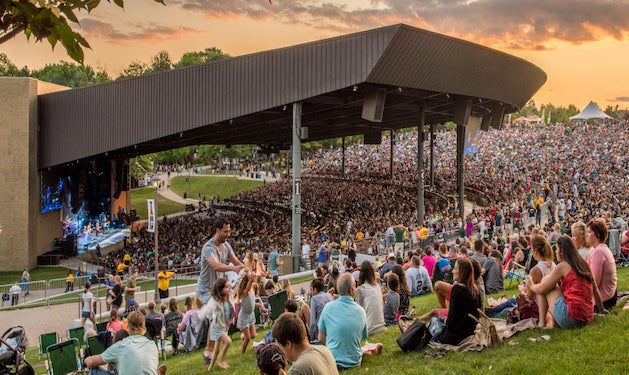Sweetwater
Scheduled to open the Woodstock festival, Los Angeles-based Sweetwater followed Richie Havens and an impromptu blessing by Swami Satchidananda and are often cited as the “first band” to perform at Woodstock. They opened with one of their best-known songs, “Motherless Child,” which, ironically, was part of Havens’ famous closing number.
Day One, Performer Two: Sweetwater
Performed Friday evening, August 15, 6:15–7:00 pm
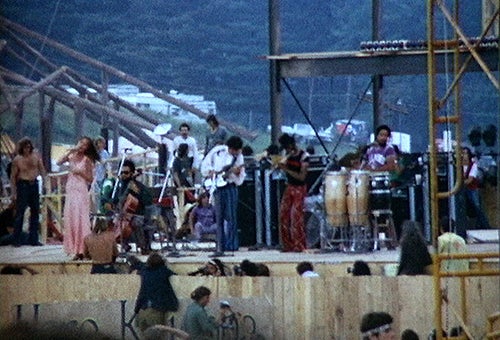
Sweetwater Band Members
- Nancy Nevins: vocals
- Albert Moore: flute, vocals
- August Burns: cello
- Alex Del Zoppo: keyboards, vocals
- Fred Herrera: bass, vocals
- Elpidio Cobian: congas, percussion
- Alan Malarowitz: drums
Sweetwater Woodstock Setlist
- Motherless Child
- Look Out
- For Pete's Sake
- Day Song
- What's Wrong
- My Crystal Spider
- Two Worlds
- Why Oh Why/Let the Sunshine In/Oh Happy Day
Sweetwater was an unusual band, even for the late 1960s. No guitar, but a flute, cello, conga, keyboard, and drums. They pioneered a new fusion of rock, folk, and jazz long before the term “jazz fusion” was commonly used. They formed “spontaneously and naturally,” as lead singer Nancy Nevins recalls:
They were strangers to me. One night, I was 17 and…on my way home from West Hollywood. I was talking to my car, and the car and I agreed I’d better stop somewhere on my way home…. I wandered into this coffeehouse on Melrose near L.A. City College. The small coffeehouse is long gone, but it was called “The Scarab.” Alex, Albert (flute), and Elpidio (percussion) were jamming with a couple other strangers. It was a 2 chord riff. I loved the sounds and I just stood up and started to jam the lyric, “sometimes I feel like a motherless child,” over their chords. It worked great. We performed spontaneously like that for almost an hour, I think. Then I just left. I had no idea who they were and I didn’t care. I felt able to drive then, I felt shy, too, and I just wanted to go home. It was a rainy school night and I still had to make it back to my mom’s house in Glendale. As far as I knew then, no one anywhere was making these sounds. The Sweetwater guys were spectacular when everyone else played guitars and drums. These guys rocked on a flute and an old Fender Rhodes keyboard, a violin, and percussion. No one did that.
Alex Del Zoppo, Albert Moore, Elpidio Cobian, and Nancy Nevins began performing together on the coffeehouse circuit, joined by August Burns, Fred Herrera, and Alan Malarowitz. Their self-titled debut album was released on the Reprise label in 1968 to modest success. On the heels of the Sweetwater album, the group performed regularly with major acts like The Doors, Eric Burdon and the Animals, Cream, Grateful Dead, Frank Zappa, and numerous others. As up-and-coming stars, Sweetwater also performed on all the major network television shows of the time: The Red Skelton Show, The Steve Allen Show, Playboy After Dark, The Hollywood Palace, and American Bandstand. By the summer of 1969, they were also appearing at all the major rock festivals, including Woodstock.
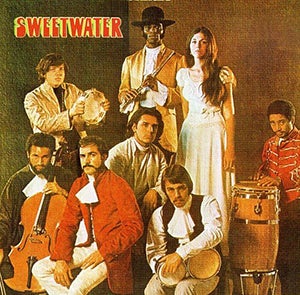
Like other groups who played Woodstock, Sweetwater were stuck in the traffic and couldn't make it to the festival site in time for them to kick off the festivities. They abandoned their attempts to drive through the sea of cars and people walking in the roadway, and they were ferried to the site by helicopter. They were amazed by the sheer size of the audience; keyboard player Alex Del Zoppo asked the pilot what kind of crops he was seeing from the helicopter, to which the pilot laughed, "those are people, dude." According to Nancy Nevins, "we were used to playing many, many pop festivals at that point, but we'd never seen anything like Woodstock." Sweetwater's Woodstock performance was energetic and well received by the audience, but the band played at a disadvantage. Festival crews had installed a platform for photographers and film crews at the foot of the stage, and the intrusion of the media was off-putting to the band members. Nancy Nevins recalls, "we'd never dealt with that. I felt phony as hell singing to the big, black camera lenses instead of happy music lovers' faces." She continued, "we were used to fans grooving at our feet, and playing with them." Compounding the problems, the stage monitors were not fully functional, so they couldn't hear themselves or each other singing. The instruments were being routed through the vocal mics, causing even more sound issues. "But even so, we knew how to be troupers, and our show went on—mostly by rote, I guess. We even got the crowd on its feet at the end of our set." Because of the sound problems with their set, Fred Herrera jokingly claims that Sweetwater was the "soundcheck for Woodstock."
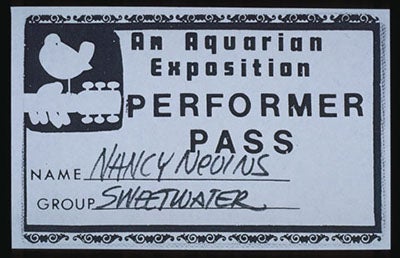
Sweetwater opened their set with their version of "Motherless Child," the song that brought Nancy together with Alex, Albert, and Elpidio in the coffeehouse days and a song Richie Havens had famously incorporated into his final song, "Freedom." This was Sweetwater's most famous song, and the audience responded enthusiastically. They followed with "Look Out," a song from their yet-to-be-released second album, Just For You (1970), then another song from their debut album, "For Pete's Sake." Another song from their upcoming album, "Day Song," followed, then the group performed four more songs from Sweetwater: "What's Wrong," "Crystal Spider," "Two Worlds," and "Why Oh Why." On that final song, the group launched into an extended jam, folding in parts of "Let The Sunshine" from the musical, Hair, and the Edwin Hawkins Singers' "Oh Happy Day." When it was all done, the audience rose to their feet to give Sweetwater a standing ovation.
Were it not for two seemingly unrelated things, Sweetwater would have benefited from their Woodstock performance and enjoyed a long, successful career as a group. The first of these happened a little more than four months after the festival. On a rainy evening, December 8, 1969, Nancy Nevins' car was stopped in traffic on a California freeway. A drunk driver plowed into her at 65 mph, spinning her car across the freeway and her head almost through the roof of the car. The top neurologists of the time didn't think Nancy would survive, and, if she did, she would likely be in a vegetative state. She died on the operating table and awoke in a coma. She describes her recovery with optimism:
I had brain damage and I have permanently lost the use of my right vocal cord. I will never sing like that early voice again. Don’t worry. I have another voice today. I quickly started to softly speak, but singing took a long, long time. I had voice training with Seth Riggs, and a famous voice doctor at UCLA, Hans von Leden, used to photograph my vocal chords. It took years, but I did find a way to sing and perform and write again. I wrote a solo album and recorded it on a new record label that no longer exists. I crashed into sobriety in 1976, and I haven’t had a seizure in 34 years. I was supposed to have seizures for the rest of my life. I am new.
While the car accident virtually ended Nancy Nevins’ singing career for 25 years, other members of the band tried to pick up where they left off. The band released two more albums, Just For You (1970) and Melon (1971), using Nancy's vocals from previously recorded sessions on some tracks. But, perhaps because of Nancy's near-death experience, the records did not chart. Or perhaps it was the second of the two post-Woodstock tragedies that kept the world from embracing Sweetwater—the omission of their performance from the 1970 documentary, Woodstock, and the subsequent soundtrack album. In 1971, Sweetwater disbanded to pursue their own careers and lives.
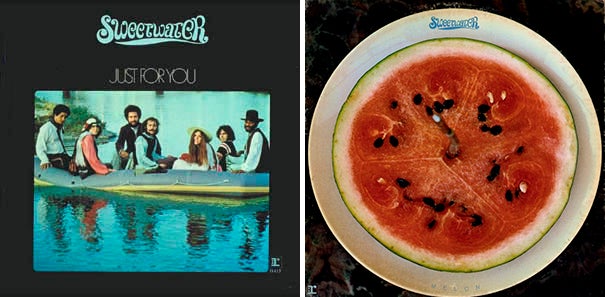
Just for You (Reprise, 1970) and Melon (Reprise, 1971)
According to Nancy, Fred Herrera Is doing wonderfully, saying that he is "in a good long-time marriage to his wife, Jennifer; he is a productive musician and does a lot of contracting for the music union in L.A." She continues about Fred that he "has remained a good friend. He is, in fact, the best person I know." Alex Del Zoppo continues to write songs and perform his music. Since the festival, he has played/recorded with The Beach Boys, Eric Burdon, Gene Clark, Donovan, Chi Coltrane, and others, and he is involved in teaching songwriting and keyboard technique. Conga player Elpidio Cobian still plays with groups occasionally, but he has had a long career working on motion picture set crews as an underwater welder, most notably for the films Jaws and The Abyss. Elpidio and his wife, Evelyn, have two adult sons, Orlando and Mario. Drummer Alan Malarowitz was only 17 when the band was formed and continued drumming for touring bands and in the studio until he died in an auto accident in 1981. Cellist August Burns is described as a "very cool guy" and was "interested, from an intellectual standpoint, in EVERYTHING." He moved to Germany to study to be a conductor but died in a tragic elevator shaft accident in 1982. Flutist/vocalist Albert Moore, who became a school teacher in northern California and is described as "enthusiastic, a wonderful entertainer, and a good man," died of lung cancer in 1994.
Nancy Nevins continues to sing since her courageous recovery, but, in her own words, "I have to spend a lot of energy on my other career, being a college professor of English. I love that, too, and find myself conflicted a lot of the time. Teaching college, I get to learn a lot. I use my voice in a different way when I teach. Interesting how life goes. Mostly, this second, I feel blessed." The surviving members of Sweetwater—Nevins, Del Zoppo, and Herrera—reunited to perform at Woodstock ’94, and they continue to pursue their solo music careers.
—Wade Lawrence & Scott Parker
